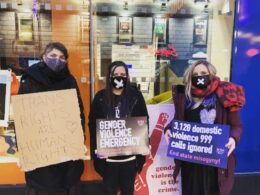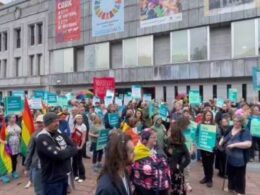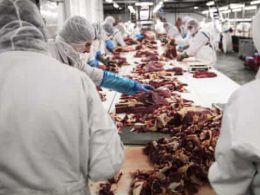By Mikey Rose, participant in the UCC encampment and Socialist Party member
In the last ten months, the global response to the genocide in Gaza has sparked a wave of solidarity actions and protests worldwide. Strikes by port workers in Greece, Italy, and India, alongside sit-ins by tech workers at Google offices in New York and California, have amplified the movement. University encampments have kept Gaza in the spotlight despite mainstream media’s waning coverage. In Cork, I was amongst students and staff who occupied the Quad on campus in a prolonged encampment, showcasing widespread outrage and commitment to solidarity with the people of Palestine.
Still, after more than six weeks of sustained protest, the University College Cork (UCC) BDS (Boycott, Divestment, and Sanctions) movement achieved an important outcome in its encampment against university management. The student protesters forced the university to recognise Israeli institutions as partners of concern, warranting alert and pre-emptive measures. This agreement includes the formation of a student-led working group to address existing partnerships, offering greater accountability and transparency. These victories and the sustained solidarity shown over six weeks were inspiring and a testament to the depth of solidarity for Palestine in the face of this murderous genocide.
Global solidarity movement
The encampment, which drew inspiration from similar movements across the globe, secured specific and enforceable concessions from UCC management. While these concessions mark a significant achievement, they also highlight the limitations of an isolated encampment movement. To exert greater force and achieve more substantial gains, a broader struggle connected with working class people is essential. There is a crucial need for workers’ unions to take stronger local actions, similar to those seen by port and tech workers.
Even as SU leadership and workers’ unions pressured the BDS group to accept weaker deals, and mediators urged them to compromise, the encampment stood firm. The university’s attempts at intimidation included sending letters expressing “concern” for participants’ mental health, suggesting they discontinue for their well-being, and using bullying tactics and threats of academic sanctions during negotiations. Despite this intense pressure from both university authorities and institutional student bodies, the movement’s deep commitment to the cause, understanding of the university’s structural limitations, strong community support, and determination to build a radical layer of activists exemplifying the power of joint struggle enabled them to withstand these pressures and achieve significant victories.
Key concessions and ongoing struggle
The agreement includes several significant commitments from UCC. The university has pledged to review its ties with Israeli institutions and war profiteers, including those through Horizon Europe and the Tyndall National Institute. Yet, UCC has not committed to advocating for the exclusion of Israel from Horizon Europe at the national level. Therefore, the movement will continue to pressure the college to advocate through the Irish Universities Association (IUA) and the government to challenge the inclusion of entities violating human rights in research funding programmes.
The agreement managed to secure written confirmation regarding the ethical oversight of partnerships with global partners of concern, including interim measures to address these concerns immediately. This includes the application of PHORMIC modules by NVIDIA and clean audits on export control, addressing the dual-use research potential. New procurement tenders will now require societal impact statements, ensuring companies justify their human rights practices.
Commercial ties under scrutiny
Despite these achievements, several demands remain unaddressed, including a demand for the immediate cutting of ties, and another for ministers to be excluded from campus until the Occupied Territories ill is passed. This highlights the need for a broader campaign involving students and workers, which can be driven by greater, more active participation at the start of the term in September. The groundwork has been laid, but the fight is far from over.
An essential aspect of the campaign has been the scrutiny of UCC’s commercial ties with major corporations like AXA, HP, and Intel, known for their involvement in or profiting from the occupation of Palestine. These ties represent a broader issue of institutional complicity in global injustices, which the movement aims to dismantle. By exposing these connections, the campaign has forced UCC to confront the ethical implications of its partnerships and set important precedents for future struggles.
The role of socialist ideas
A key factor in the success of this campaign was the analysis, driven by the perspectives Socialist Party members. We emphasised the crucial support of trade unions and the broader movement to exert full pressure on the college. Strategic pressure was built to secure concrete wins, boosting confidence while continually assessing our capacity and urgency. Democratic participation and organising were vital, with trust in leadership fostered through open communication, fluid structures, and active involvement. These perspectives were crucial in navigating the complex political and organisational challenges, ensuring that the actions were not only reactive but also strategically oriented towards achieving long-term goals.
A socialist analysis helped us to understand the broader systemic issues at play, emphasising the role of the working class in ending the oppression and exploitation rooted in the capitalist system. Discussions within the encampment often centred on the importance of class struggle, international solidarity, and the interconnectedness of various forms of oppression, clarifying the need for a broader strategy to defeat the Israeli regime that is coordinated through local and international working-class movements. In these disucssions, Socialist Party highlighted the role of the Palestinian masses themselves, allied with the working class in the region, including the Israeli Jewish working class in defeating and overthrowing the racist, colonial Israeli State and the capitalist system it is part of.
Building a broader movement
The encampment at UCC was part of a wider national movement, with similar actions taking place at Trinity College Dublin, University College Dublin, Maynooth University, and Queen’s University Belfast. The timing of this movement during the summer, when university activity and student presence are lower, diminished its impact, reducing pressure on university management. However, this highlights the necessity for sustained and ongoing struggle, even as movements experience lulls. Connecting with wider struggles – such as student protests in Bangladesh, anti-far right movements, housing protests, and the fight for trans rights – can help to exert continuous pressure on those in power.
Support from the Cork Palestine Solidarity Campaign (CPSC), workers’ unions, and staff members was crucial in sustaining the encampment. However, as initial support waned, it became evident that the student movement couldn’t sustain the broader campaign alone. While increased pressure over six weeks was vital, union and staff backing was key. For encampments to succeed, they must be part of a larger civil disobedience strategy, including strikes, walkouts, and protests, to clearly demonstrate through mass public pressure that business as usual cannot continue in the face of such urgent issues. This broader mobilisation is essential to maintain momentum and achieve a lasting drive for change.
Looking ahead
The victories achieved at UCC represent a significant step forward, but they are just a small part of the broader struggle. The campaign exposed the limitations of college institutions, particularly their prioritisation of commercial viability over ethical commitments. This insight is critical for rebuilding momentum in September, addressing remaining demands, and ensuring UCC fulfils its commitments. Moreover, it underscores the need for systemic change within the capitalist framework that universities operate under.
The UCC BDS campaign showed that student activism, when supported by a strong theoretical framework and a broad movement, can achieve notable victories. However, building on these foundations requires focusing on the wider implications of privatisation and advocating for public democratic control of our institutions. The campaign revealed the commercial nature of colleges in Ireland, highlighting the necessity of targeting all campuses and pushing for structural changes. This approach emphasises the interconnectedness of various struggles and the importance of addressing their root causes within capitalism.
The achievements at UCC highlight the importance of analysing the contradictory interests inherent in our college system and building solidarity to combat the complicity in exploitation, imperialism, and oppression. This movement illustrates the potential of student-led activism to drive significant institutional changes, whilst emphasising the need for a broader working-class action, connecting local struggles to broader movements for systemic change, including civil disobedience tactics like strikes and walkouts to maintain pressure and build momentum against capitalist structures and system.












